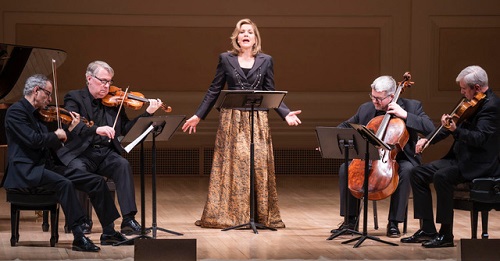 United States Various: Renée Fleming (soprano), Simone Dinnerstein (piano), Uma Thurman (narrator), Emerson String Quartet. Carnegie Hall, New York, 23.1.2022. (RP)
United States Various: Renée Fleming (soprano), Simone Dinnerstein (piano), Uma Thurman (narrator), Emerson String Quartet. Carnegie Hall, New York, 23.1.2022. (RP)

Barber – String Quartet in B minor, Op.11
Glass – Mad Rush
Grieg – ‘Lauf der Welt’, ‘Zur Rosenzeit’ (Sechs Lieder, Op.48)
Fauré – ‘Les berceaux’, Op.23 No.1, ‘Au bord de l’eau’, Op.8 No.1
Puts – ‘Evening’
Previn – Penelope
There was an elegiac mood to this concert with soprano Renée Fleming, pianist Simone Dinnerstein and the Emerson String Quartet at Carnegie Hall. Much of it had to do with the works that were performed, but also with the realization that we have not been frozen in time for the past two years of the pandemic. Now 62, Fleming will eventually fade from the concert stage, and the Emerson has announced that it will disband at the end of the 2023 season. Of the musical performers on stage, the future belongs only to the incomparable pianist Simone Dinnerstein.
The first work on the program, Samuel Barber’s String Quartet in B minor, casts such a mood in and of itself. The quartet’s second movement – better known as the Adagio for Strings in the composer’s arrangement of it for string orchestra – is almost synonymous with mourning. In this instance it was dedicated to Roger Tapping, violist with the Juilliard String Quartet, who had died a few days earlier from cancer. The quartet played with a depth of emotion that held the audience spellbound.
Dinnerstein’s performance of Philip Glass’s Mad Rush was mesmerizing. Glass, who was in the audience, composed Mad Rush in 1979 to be performed on the occasion of the Dalai Lama’s appearance at New York’s Cathedral of Saint John the Divine. The pianist was masterful in creating tension in each of the countless repetitions of the musical phrases, and then releasing it through notes that sounded in the lowest extremes of the piano’s range. Dinnerstein sat motionless at the piano, as if in a transcendental trance, with her fingers spinning out the work’s seemingly timeless, unending arpeggios.
Fleming told the audience that during the pandemic she coped by reconnecting with nature and taking long walks along the trails near her home in Virginia. Her recent recording, In Voice of Nature: The Anthropocene with Yannick Nézet-Séguin, was a product of her lockdown experiences.
With Dinnerstein at the piano, Fleming performed five songs from the recording, two each by Edvard Grieg and Gabriel Fauré and ‘Evening’ by Kevin Puts, who was also in the audience. There were moments of beauty in the Grieg and Fauré songs, especially in the French composer’s ‘Les berceaux’ with its gently rocking melodies, but Fleming connected more deeply with Puts’s setting of Dorianne Laux’s poem that contemplates the threat climate change and other ecological disasters pose to our planet.

The main work on the program was André Previn’s Penelope for soprano, narrator and strings, which was unfinished when he died in February 2019 at the age of 89. His longtime editor, David Fetherolf, completed the work from a pile of manuscript pages without bar numbers and few page numbers. Penelope received its premiere at the Tanglewood Musical Festival that same summer with the music performed by Fleming, the Emerson and Dinnerstein, as it was here.
Playwright and screenwriter Tom Stoppard wrote the text for the monodrama drawn from the Odyssey, Homer’s epic poem. Instead of relating the adventures of Odysseus during the ten years when he was fighting in the Trojan Wars and the equal amount of time it took him to return to Ithaca, Stoppard focused on Penelope’s plight as she spent her days weaving and fending off prospective suitors.
Rather than the stoic wife of myth, Stoppard’s Penelope is a bit bitchy, lamenting the twenty long years lost to housekeeping and chastity. She also took jabs at her cousin Helen, the most beautiful woman in the world, who started the Trojan War when she ran off with Paris. Penelope the Dutiful pondered whether she should curse the wife-stealing Paris or Helen, a bolter with the glow of a goddess and a bottom like a cleft peach.
The Emerson paired the Barber string quartet with Penelope as they had at its premiere and in subsequent performances. Surprisingly, Previn’s score was more at one with Glass’s minimalism than Barber’s neo-Romanticism. There were recurring themes in Penelope, perhaps evoking her countless hours spinning thread, that brought to mind similar swirling motifs in Mad Rush. Whether intentional or not, Dinnerstein provided the musical link between the two halves of the program.
Previn’s musical setting of the text was tailor-made to suit Fleming’s voice, resting as it does primarily in her rich, still vibrant middle range. This was a performance to savor by the much-beloved soprano.
Uma Thurman’s pointed, at times arch, narration provided Penelope’s bite. She was wonderfully wry in capturing the forlorn woman’s predicament, adding an element of surprise and intrigue to each twist in the plot through the words alone. The all-knowing tone in her voice and twinkle in her eye brought the work to a close as she told how Penelope blithely accepted her husband’s explanation for staying away so long: the nymph Calypso fell in love with him and wanted to make him immortal.
It was an offer that Penelope knew no man, especially Odysseus, could resist.
Rick Perdian